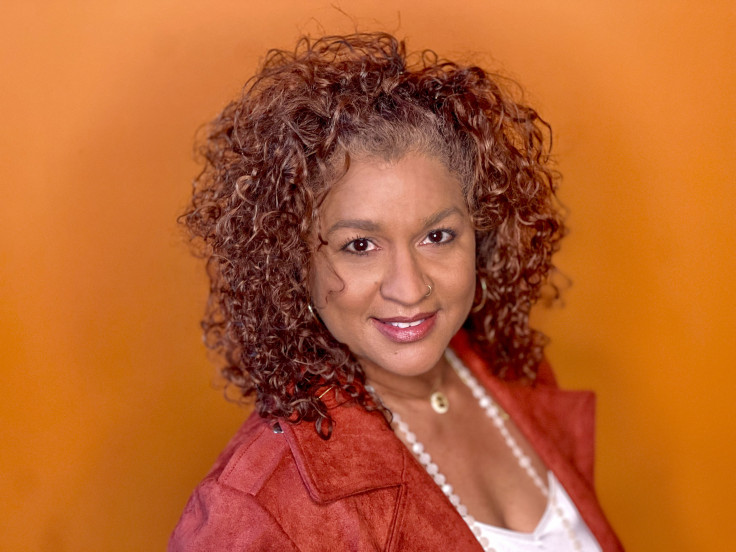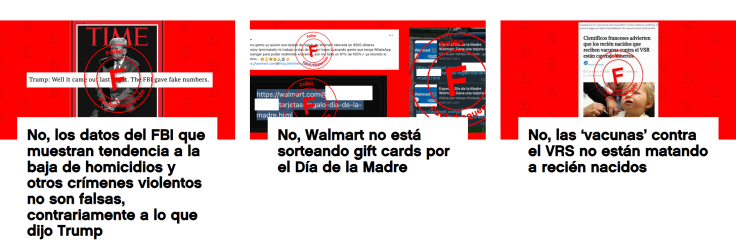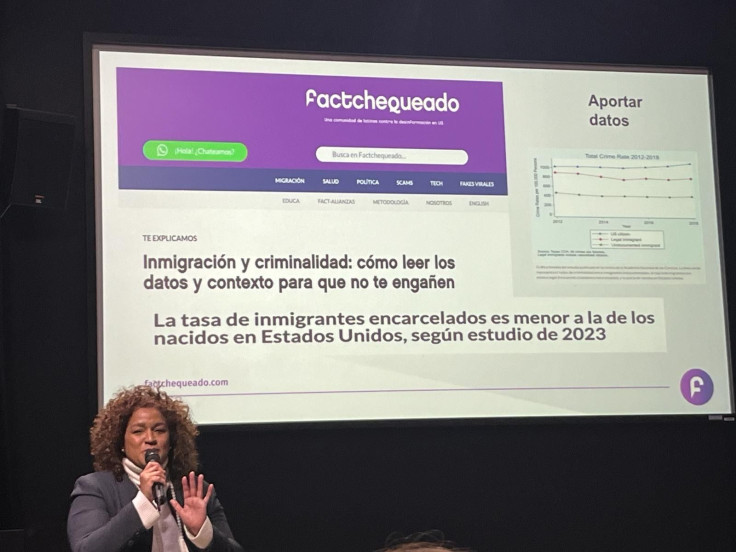
It is expected that close to 17.5 million Latinos will be casting a ballot this upcoming presidential election. And the demographic's vote could have outsized importance given Latinos' presence in decisive in battleground states like Arizona and Nevada, where they turned out in record numbers for the midterms in 2022.
But as the Americans gear up for what is set to be a consequential election, concerns about issues such as misinformation and disinformation take a more prominent spot in the political conversation.
A recent report by the Reuters Institute and the University of Oxford revealed that Latinos have emerged as prime targets of misinformation this election season, as campaigns increasingly target the largest minority in the country with the help of new technologies like Artificial Intelligence and more traditional spin-the-narrative methods that have proven to be extremely efficient in the past.
The reasons behind why misinformation is so prevalent among Latino communities abound. But there's one that comes up time and time again: they do not have the same resources as English speakers to inform themselves or verify the veracity of the information they're bombarded with every day.
Tamoa Calzadilla is no stranger to this reality. In fact, she was a pioneer in finding ways to combat misinformation among Latinos as the former director of Univision's elDetector, the first Spanish-language fact-checking platform in the country. Through her work she became prominent in the field to the extent that, when Spain's Maldita.es and Argentina's Chequeado joined forces to create a brainchild in the U.S. in 2022, Calzadilla became Editor in Chief of the new site, a position she still holds.
The site is called Factchequeado and this is part of their motto:
"We believe that journalism is a public service, and as such, it should be transparent, collaborative, innovative, and of high quality. We are committed to contributing to the development of strong, critical, and informed communities that can counter misinformation. We aim to provide citizens with quality journalism and educational tools so that they can base their decisions on data and evidence rather than rumors and prejudices. Our community has mechanisms in place to detect falsehoods on its own."
Fresh off winning a prestigious John S. Knight Fellowship for her contributions to journalism, Tamoa Calzadilla sat down with The Latin Times to discuss what misinformation looks like in 2024, what methods are being used to spread it around and what part do emotions play in the cycle.
The following interview has been translated from Spanish and edited for brevity and clarity.

How did Factchequeado come to be?
It was born in April 2022 as a pilot project of Chequeado and Maldita to provide fact-checking in Spanish for Latino communities. The idea was to create a system of alliances with media outlets that wish to do fact-checking for the Latino community so they could use our content for free. In exchange we would get access to information, we could have awareness around which topics we need to check out. This way we can have visibility of what's happening in New York, in the border, in the Midwest, in South Florida.
At this moment we have over 80 allied organizations throughout the United States. Some of them are big media conglomerates like Univision. Others are verifiers like politifact.org that are in English but are now starting to do things in Spanish. But we also have smaller allies like Conecta Arizona, Conexión Migrante, Madre Tierra Philly. I think the count is up to allies across 21 states. And we also have El Nuevo Día in Puerto Rico.
Besides fact-checking, we also provide open resources like our bilingual guide for journalists who cover Latino communities in the U.S.
So why is it so important for Latinos to have fact-checking sites catered to them?
When you receive misinformation in English you have several resources to verify it. The New York Times, The Washington Post, along with more than ten fact-checking platforms. In contrast, in Spanish there are fewer quality information sources. Moreover, we need to consider that there are specifities with this demographic. Latino and Spanish-speaking communities are two different things: not all Latinos speak only Spanish or only English. They are not all the same, and they don't have the same informational needs or the same informational gaps.
At the same time, we feel that there is a vulnerability for Latinos due to the way they consume social media. They get informed through YouTube, Facebook, and communicate a lot via WhatsApp, which is an encrypted system. It's challenging to see the absurdities being spread there.

Checking out your website I understand you handle two variables to determine what kind of news merits fact-checking: virality and level of harm. Can you explain how this process works and how you created your methodology?
Well, first of all we're signatories of the International Fact-Checking Network which is an organization that offers regulations, methodologies and codes of conduct that we must all follow as fact-checkers. We're more than 100 signatories and we're committed to being non-partisan, being transparent with sources, being plural and conducting open-source investigations. We're also 100% transparent with the funds we receive.
Fact-checking per se involves a journalistic methodology based on tags or labels. We have false, needs context, no evidence and true. That verdict comes after checking sources and verifying the veracity of images, videos and audios through several technological processes.
We make editorial decisions based on virality and level of harm. Virality means we have a monitoring system that is assisted by artificial intelligence and is constantly improving. Through this system we can understand when something is very viral in social media. If it's not viral, our principle is that we are not going to make it viral ourselves because it has been proven that then you do a disservice: you strengthen the reach of fake news.
The level of harm comes into play when, for example, you're dealing with health issues that may be detrimental to a lot of people. In those cases we decide to act and we do explainers. A good example was what happened with vaccines during the pandemic. We needed to act quickly before certain narratives became viral.
What are scammers and "disinformers" doing to spread misinformation in 2024?
Well these are the first elections with generative Artificial Intelligence doing its thing so that's a challenge right there. There isn't necessarily a regulation to prevent a political party or someone involved in politics from deceiving you with fake news or anything else. There's also a lot of concern around X (formerly Twitter) because since Elon Musk took over he eliminated all systems that Twitter was trying to implement to control or moderate misinformation.
We don't like to use the word "control" because we like to defend the first amendment at Factchequeado. So we talk about regulating, moderating. If you as a user want to see a certain content then great but you should know that it has been manipulated. If you want to listen to this audio or if you want to look at that video, I want you to know that it's made with AI and it's a deepfake. Knowing that, then go ahead and watch it.
What role do people's emotions play in the spread of misinformation?
The technique that disinformers have perfected is to target your guts, your emotions. That's the reason why things go viral. They target your deepest fears. There's this great example of a story that's been viewed a lot on our website that's about a girl that supposedly disappeared at Disney. We've debunked it several times. But it's your deepest fear as a parent, right? So you share. And disinformers know this.
Happiness is also a powerful tool. "Click here and get a free shopping spree" or "get rich by watching these videos." Sadness also works. Every time there's a tragic event or maybe a child dies, that's fertile ground for scammers. They've also become very adept at using language that speaks to urgency: "alert", "breaking news". They've gotten ahold of this "urgent" tone that plays well with short videos that target emotions. It's become a big challenge for us because when we do fact-checking we appeal to reasoning, not emotions.
What are some of the themes or topics that you feel are gaining steam among the Latino community when it comes to misinformation in this election cycle?
We made a piece about several topics that concern us and their veracity back in February. Those who try do disinform in electoral years like this one usually use fear as a tactic. They say for example that the Democratic party is an ally of Nicolas Maduro, Díaz-Canel or the Ortegas in Nicaragua. That this is socialism or communism, that it looks like we're heading in that direction. That sort of misinformation goes viral quickly.
There's also misinformation that produces discrimination and xenophobia. For example, the one that says that we're in the middle of "an invasion of criminals" and that all those people coming into the country are coming to commit crimes. Sometimes they latch onto something that actually happened like the Venezuelan man that killed the student from Georgia and then they make generalizations, ignoring that most mass shooters are white Americans. So it has to do with which narrative you manage to impose
Overall, crime is being used to paint a picture of chaos when the numbers show that crime is actually decreasing and has been decreasing since it reached a peak during the pandemic. Homicides, violent crimes, they're all decreasing. So we're trying to communicate these ideas but you see that many politicians continue to echo those narratives. We're concerned about people making bad decisions this election cycle based on the wrong reasons. We all have an opinion and we can vote for whoever we want. What we want is for people to make that decision based on evidence and not misinformation.
© 2024 Latin Times. All rights reserved. Do not reproduce without permission.







